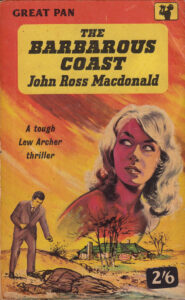 Spoiler Alert
Spoiler Alert
The Good and the Bad
First, the good:
- Macdonald achieves a rapid pace that will become his trademark. Lew Archer’s cases don’t take months or even weeks. They are measured in days. Archer’s relentless pursuit shows us his dedication and the personal importance of the case to him. Also, the hour-by-hour developments keep us from being distracted.
- Archer really shines in his interrogation of Dr. Frey and how he pulls it all together at the end with Bassett.
- Macdonald gives us several memorable minor characters, Rina Campbell and Carol Busch.
- Although I did not mention it for reasons of length, early on there is a reference to yet another of Archer’s missed opportunities to start a family, lending a quiet poignancy to the first chapter. Reading it, we know Archer will never marry again.
And now the bad:
- This is exactly the kind of book that Macdonald did not want to write—a violent potboiler with clearly identifiable villains and heroes. Graff and Stern are not good men gone bad—they are each paragons of evil in their own way. So is Isobel’s father, although he never appears in the book.
- The book is a piece of revenge at Hollywood. Certainly both Macdonald and his wife had cause to believe they had been shabbily treated by the studios. It goes with the territory. But the view of Hollywood he presents here is so brutal and dark, lacking in any nuance, it simply fails as a credible portrait of a complex business. Macdonald presents a much more balanced view of the movie industry in many of his other books, including The Way Some People Die. And as if his portrait of Hollywood wasn’t enough of a caricature, he invents a connection with mob money from Las Vegas that (as far as I can tell) has no basis in historical fact.
- In his early years, Macdonald worshipped Raymond Chandler and was repeatedly kicked in the face for his troubles. Eventually he shifted from the “turn the other cheek” to “an eye for an eye,” as this book demonstrates.
- His wars with Hollywood and Chandler weaken the book. Half the book turns on the stupid and unnecessary move of Hester’s body to Las Vegas. Graff is a wealthy man and certainly has a yacht, or easy access to one; and he has at least three confederates who will do anything for him. A moonless night, a canvas sack and a couple of cinderblocks and nobody will hear from Hester again. The plan as executed was the worst possible idea. Leaving the body in the desert for scavengers to scatter might delay discovery almost indefinitely and leave cause of death unclear. Graff selects the silliest option—incinerating the body in a building near an airport where it is certain to be found. It will take about a day to track the body to LA once it is identified. The whole thing is pointless. And, if anybody cares, necessarily involves another murder, that of Rina.
- Macdonald spends 95% of the book demonstrating how weak and contemptable Bassett/Chandler is. He is forced to spend the last pages backtracking. Bassett had the nerve to see through the killing of Gabrielle after Isobel botched it; and then he even leverages the death into a blackmail opportunity against one of the most powerful men in California. He takes on a ruthless mobster who has killed countless men and kills him with a knife. You may not like his morals but he has plenty of nerve and physical courage when he needs it.
Two Drinks Behind
It was said by Humphrey Bogart (and it was probably not originated by him) that the trouble with the world is that everybody is two drinks behind. If everybody would relax, knock back a couple, and take time to reflect, we would all come to better decisions.
If Macdonald had taken Bogart’s advice he would have realized that his feud with Chandler and the studios only turned a compact story into a bloated, implausible mess and he would have turned in a better, shorter book.
Next we will pause to give a short historical summary of the debacle Linda Millar caused in Macdonald’s personal life, and then we will return to his next book, The Doomsters.
Please follow and like us:
Recent Comments